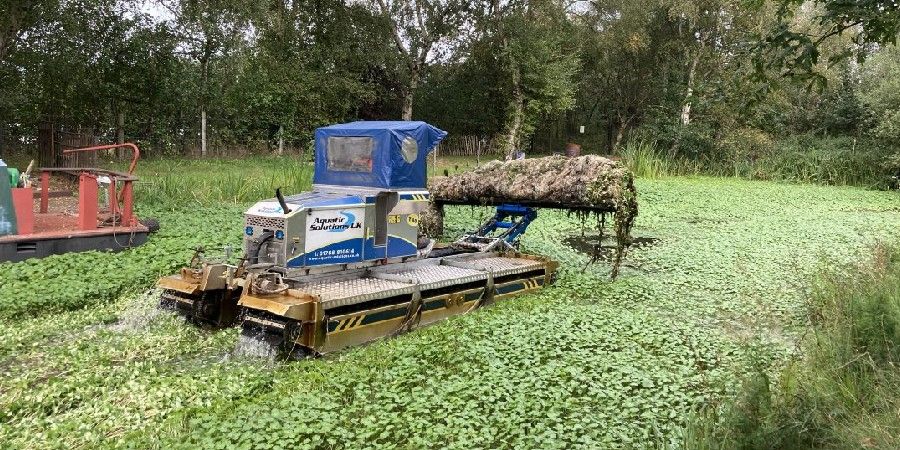Warnings of increasing battle against aquatic weeds in London & South East

We are currently fighting a battle against invasive weeds across our waterways in London & South East.
Growing rapidly in the summer and able to quickly cover the surface of canals, the weeds impede the passage of boats and a pose a threat to the wildlife that flourishes along the nation’s manmade canals.
Removing the weed
Our teams are working day-in day-out removing the weed, often with specialist boats that scoop off the weed from the surface of the water. However, warmer wetter summers brought about by climate change are making the fight by the charity to stop canals from becoming choked by invasive weeds ever more challenging.
Our annual summer programme to tackle the weed, particularly prevalent on the Regent’s Canal, Grand Union Canal and River Lee Navigation is well underway – with volunteers, staff and contractors working to remove the weed helping to prevent it clogging up canals and harming native wildlife. Last year, the charity had to invest over £1 million nationwide to fund the removal of more than 2,500 tonnes of invasive weed.
Warmer summers speed aquatic weed growth
Aquatic weeds like duckweed, floating pennywort and azolla grow extremely quickly on canals. Azolla can double in size every three days, while some of the fastest-growing weeds can double in size within a matter of hours. Left unchecked, the weed causes problems for boats, rowers and anglers. By forming a mat across the top of the water, they starve other plants of light, suck up the oxygen fish need to breathe and, in turn, damage much-loved species higher up the food chain such as kingfishers and otters.
Warmer summers are increasing the growing months for invasive aquatic weeds. While not directly harmful, people, dogs and other animals have been known to mistake the green carpet it forms for grass and ended up in the water.
The proliferation of weed in summer isn’t new, but the hotter weather and fiercer storms that are becoming more common as a result of climate change are making the problem worse. Weed likes high temperatures, along with plenty of rain that washes nutrient from the surrounding area into the waterways.
Physically removing the weed is the usually the way to respond to the phenomenon, and our teams, contractors and volunteers across England and Wales have a small fleet of boats to help scoop up the weed and take it away.
More frequent hotter summers
Our regional director Ros Daniels says: “The changing climate, with hotter summers becoming more common, is making this natural phenomenon even more of a challenge. The weed isn’t directly harmful, but it can quickly clog up canals causing problems for canal users and wildlife.
“It is important our charity carries out work like this to keep our historic manmade canals available for everyone to use and enjoy and each year we are finding that we’re having to clear thousands of tonnes of weed. We run regular volunteer parties where people can get involved in all sorts of tasks to care for their local waterway, including removing weed, and we’d welcome any help including donations to help keep our canals alive.”
